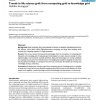438 search results - page 21 / 88 » From Law-Like Knowledge to Concept Hierarchies in Data |
TSMC
1998
13 years 8 months ago
1998
—Knowledge representation is one of important factors that determine human performance on cognitive tasks. Due to different levels of experience, different groups of people may d...
BMCBI
2006
13 years 8 months ago
2006
Background: Grid computing has great potential to become a standard cyberinfrastructure for life sciences which often require high-performance computing and large data handling wh...
SAINT
2003
IEEE
14 years 1 months ago
2003
IEEE
The content of the world-wide web is pervaded by information of a geographical or spatial nature, particularly such location information as addresses, postal codes, and telephone ...
LPAR
1999
Springer
14 years 22 days ago
1999
Springer
Abstract. Description Logics (DLs) are a family of knowledge representation formalisms mainly characterised by constructors to build complex concepts and roles from atomic ones. Ex...
CIKM
2009
Springer
14 years 3 months ago
2009
Springer
Data generalization is widely used to protect identities and prevent inference of sensitive information during the public release of microdata. The k-anonymity model has been exte...

